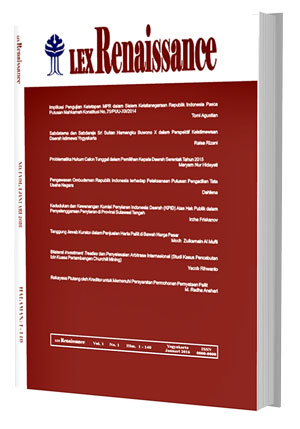Main Article Content
Abstract
The rule of evidence in the existence of a price fixing agreement according to Article 5 of Law No. 5 of 1999 on Monopoly and Unfair Business Competition refers more to material evidence without prejudice to written evidence as formal evidence. Therefore, this study aims to analyze: first, what are the evidences that can be used by the Business Competition Supervision Commission (KPPU) in examining alleged cartel violations; and second, what is the rule of evidence which is carried out by KPPU in examining alleged cartel violations. This is a normative research with statutory approach and case studies. The results conclude that the actions of the business actors as reported parties tend to be the actions that are prohibited by law. Meanwhile, the KPPU Decision No. 06/KPPU-I/2013 on the Cartel Case of the Belawan Port Container Transport Tariff in Indonesia, in the process of proving it, applies indirect evidence as a guide to complete the evidence in the Commission Council session. The basis for the consideration of the District Court and Supreme Court is the belief that indirect evidence is not regulated in Indonesian procedural law. However, in its development, in 2011 the Supreme Court began to acknowledge indirect evidence through the Supreme Court Decision on rigging tender case No. 906K/Pdt.Sus/2010.
Keywords
Article Details
Authors who publish with this journal agree to the following terms:
a. Authors retain copyright and grant the journal right of first publication with the work simultaneously licensed under a Creative Commons Attribution License that allows others to share the work with an acknowledgement of the work's authorship and initial publication in this journal.
b. Authors are able to enter into separate, additional contractual arrangements for the non-exclusive distribution of the journal's published version of the work (e.g., post it to an institutional repository or publish it in a book), with an acknowledgement of its initial publication in this journal.
c. Authors are permitted and encouraged to post their work online (e.g., in institutional repositories or on their website) prior to and during the submission process, as it can lead to productive exchanges, as well as earlier and greater citation of published work (See The Effect of Open Access).References
- Buku
- Fuady, Munir, Hukum Anti Monopoli Menyongsong Era Persaingan Sehat, Citra Aditya Bakti, Bandung, 2003.
- Kamal, Rokan Mustafa, Hukum Persaingan Usaha: Teori dan Praktiknya di Indonesia, RajaGrafindo Persada, Jakarta, 2012.
- Lubis, Andi Fahmi, dkk., Hukum Persaingan Usaha: Antara Teks & Konteks, KPPU Republik Indonesia, Jakarta, 2009.
- Suhasril dan Muhammad Taufik Makrao, Hukum Larangan Praktik Monopoli dan Persaingan Usaha Tidak Sehat di Indonesia, Ghalia Indonesia, Bogor, 2010.
- Yani, Ahmad dan Gunawan Widjaja, Seri Hukum Bisnis Anti Monopoli, RajaGrafindo Persada, Jakarta, 1999.
- Jurnal
- Anggaraini, Anna Maria Tri, “Penggunaan Analisis Ekonomi dalam Mendeteksi Kartel Berdasarkan Hukum Persaingan Usaha” Jurnal Persaingan Usaha Komisi Pengawas Persaingan Usaha, Edisi 5, Komisi Pengawas Persaingan Usaha Republik Indonesia, Jakarta, 2010.
- Makalah
- Anisah, Siti, “Penyelesaian Sengketa KPPU dan Pembuktian Tidak Langsung pada Kasus Kartel” Makalahdalam Diskusi Akademik KPPU RI dengan Narasumber Hukum Persaingan Usaha Fakutas Hukum Universitas Islam Indonesia, Yogyakarta, 2013.
- Syamsuddin, M., “Metodelogi Penelitian Hukum”, Makalah untuk Kuliah Program Magister Hukum Fakultas Hukum Universitas Islam Indonesia, Yogyakarta, 2020.
- Internet
- Hasim Purba, “Tinjauan terhadap Holding Company, Trust, Cartel dan Concern”,http://repository.usu.ac.id/handle/123456789/1507, diakses tanggal 22 Januari 2016.
- “Kartel Pengusaha Angkutan di Belawan”, http://medan.kppu.go.id/ 2014/11/kartel-pengusaha-angkutan-di-belawan/, diakses tanggal 28 Januari 2016.
- Peraturan Perundang-Undangan
- Undang-Undang No. 5 Tahun 1999 tentang Monopoli dan Persaingan Usaha Tidak Sehat.
- Peraturan Komisi Pengawas Persaingan Usaha Nomor 4 Tahun 2010 tentang Pedoman Pelaksanaan Pasal 11 Undang-Undang Nomor 5 Tahun 1999 tentang Kartel.
References
Buku
Fuady, Munir, Hukum Anti Monopoli Menyongsong Era Persaingan Sehat, Citra Aditya Bakti, Bandung, 2003.
Kamal, Rokan Mustafa, Hukum Persaingan Usaha: Teori dan Praktiknya di Indonesia, RajaGrafindo Persada, Jakarta, 2012.
Lubis, Andi Fahmi, dkk., Hukum Persaingan Usaha: Antara Teks & Konteks, KPPU Republik Indonesia, Jakarta, 2009.
Suhasril dan Muhammad Taufik Makrao, Hukum Larangan Praktik Monopoli dan Persaingan Usaha Tidak Sehat di Indonesia, Ghalia Indonesia, Bogor, 2010.
Yani, Ahmad dan Gunawan Widjaja, Seri Hukum Bisnis Anti Monopoli, RajaGrafindo Persada, Jakarta, 1999.
Jurnal
Anggaraini, Anna Maria Tri, “Penggunaan Analisis Ekonomi dalam Mendeteksi Kartel Berdasarkan Hukum Persaingan Usaha” Jurnal Persaingan Usaha Komisi Pengawas Persaingan Usaha, Edisi 5, Komisi Pengawas Persaingan Usaha Republik Indonesia, Jakarta, 2010.
Makalah
Anisah, Siti, “Penyelesaian Sengketa KPPU dan Pembuktian Tidak Langsung pada Kasus Kartel” Makalahdalam Diskusi Akademik KPPU RI dengan Narasumber Hukum Persaingan Usaha Fakutas Hukum Universitas Islam Indonesia, Yogyakarta, 2013.
Syamsuddin, M., “Metodelogi Penelitian Hukum”, Makalah untuk Kuliah Program Magister Hukum Fakultas Hukum Universitas Islam Indonesia, Yogyakarta, 2020.
Internet
Hasim Purba, “Tinjauan terhadap Holding Company, Trust, Cartel dan Concern”,http://repository.usu.ac.id/handle/123456789/1507, diakses tanggal 22 Januari 2016.
“Kartel Pengusaha Angkutan di Belawan”, http://medan.kppu.go.id/ 2014/11/kartel-pengusaha-angkutan-di-belawan/, diakses tanggal 28 Januari 2016.
Peraturan Perundang-Undangan
Undang-Undang No. 5 Tahun 1999 tentang Monopoli dan Persaingan Usaha Tidak Sehat.
Peraturan Komisi Pengawas Persaingan Usaha Nomor 4 Tahun 2010 tentang Pedoman Pelaksanaan Pasal 11 Undang-Undang Nomor 5 Tahun 1999 tentang Kartel.




